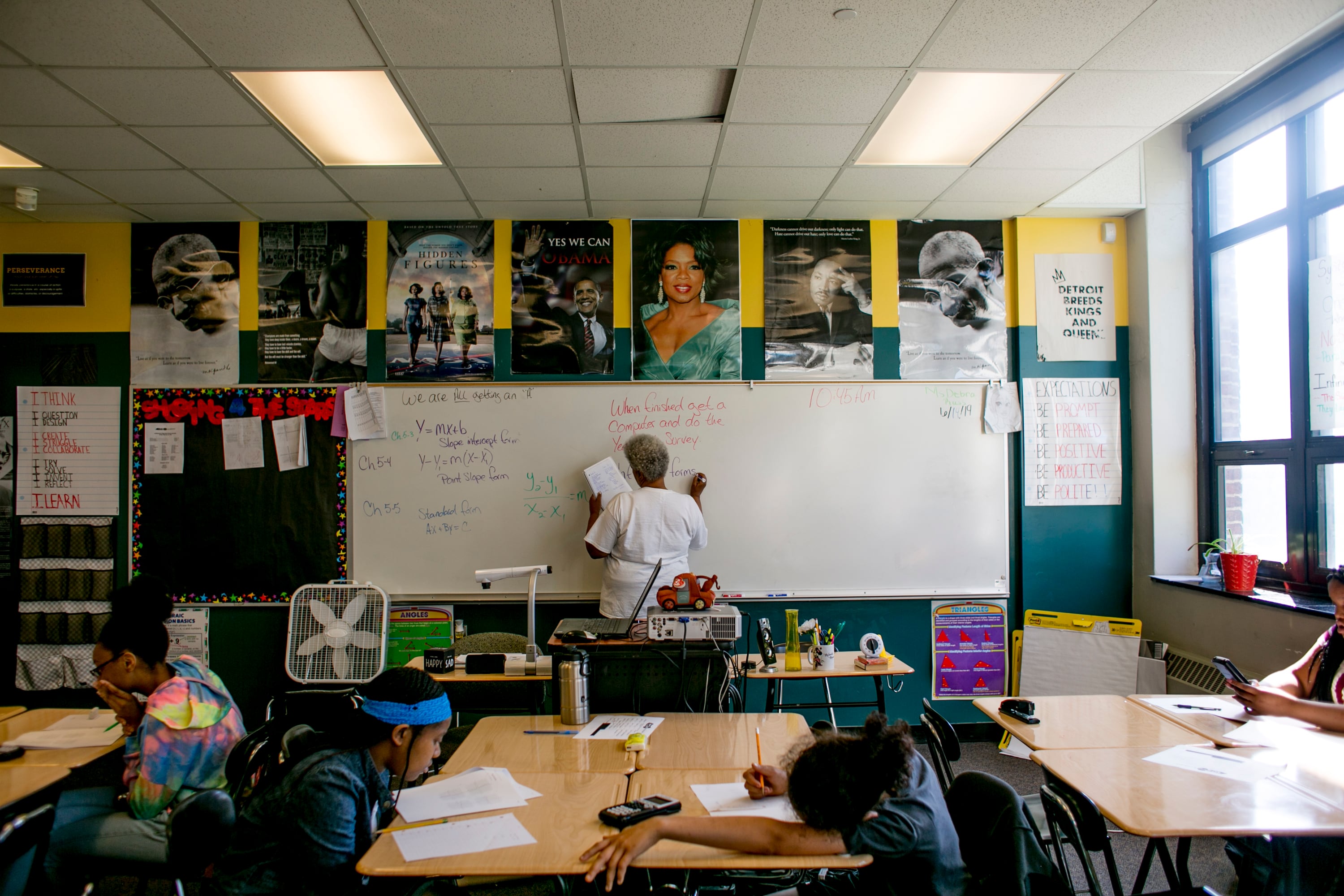Sign up for Chalkbeat Detroit’s free daily newsletter to keep up with the city’s public school system and Michigan education policy.
A tax proposal on the Nov. 5 election ballot comes with high stakes for the future of the Detroit Public Schools Community District.
The proposed operating millage would be not for DPSCD, but for the separate Detroit Public Schools, the entity that exists solely to collect tax revenue and pay off debt. It would increase the millage rate business owners and other non-homestead property owners in the city pay to support schools, providing revenue to pay off that debt quicker if it passes.
That’s still important for DPSCD, though, because once that debt is paid off, revenue from the millage will go toward its operations. The sooner the debt is eliminated, the sooner the revenue can start supporting classrooms.
DPSCD was created in 2016 as part of a legislative initiative to address burdensome debt in Detroit schools and give the newer district a debt-free start focused on educating students.
The current DPS millage rate is 16.6 mills — or $16.60 for every $1,000 of taxable value. That’s below the statewide standard of 18 mills, because state law requires a rollback when property values have not kept pace with inflation. Voters must approve an increase back to the 18 mills.
If the ballot proposal passes, in the first year that the millage increases to 18 mills, it would raise an estimated $9.6 million, according to the district.
And in the long term, that revenue would become part of DPSCD’s general fund revenue, Superintendent Nikolai Vitti wrote in an email to Chalkbeat.
At that point, Vitti said, the funds would come with a lot of flexibility. They could support “teacher salaries, facility improvements, and operational costs, such as transportation, which restricted federal and state grants cannot” be used for.
The first year that revenue from the operating debt millage could shift back to DPSCD would be 2032, but this would depend on tax collection rates, future growth in property values, and interest rates, Vitti said.
In the short-term, the increased millage “will allow the district to pay off its legacy debt faster — and then fund the district at the highest amount locally,” he said.
That legacy debt can be traced back to the school district’s split from Detroit Public Schools in 2016, when the Michigan Legislature created the Detroit Public Schools Community District to operate the city’s public schools.
State lawmakers intervened when the district was facing crippling debt and potential bankruptcy due to years of financial turmoil and economic instability in the city. Periods of mayoral control of the district and emergency state management further destabilized the district’s finances.
When the legislature stepped in, the old Detroit Public Schools became an entity solely to collect taxes and pay down the district’s debt.
DPSCD, meanwhile, became the operator of Detroit schools and began receiving its foundation allowance, or per-pupil funding, from the state. This structure differs from other districts, which use a combination of local property taxes and state funding. Once the old DPS entity pays off its debt, DPSCD funding would be made up of the same combination.
Over the coming weeks, the district is hosting several information sessions about Proposal S.
For his part, Vitti points to several benchmarks that he said show the district has turned the corner from the days of economic uncertainty, such as consecutive years of clean audits and no financial penalties, the reduction of state and federal oversight, and a rebound in student achievement after the pandemic.
Phillip Caldwell, a school finance expert at Eastern Michigan University, emphasized a point that district officials often make: that DPSCD is not equitably funded compared with other districts. So “any additional resourcing to DPSCD will be significant because it’s something that they don’t have.”
In other words, he said, the passage of Proposal S is integral to the district’s financial stability.
Caldwell said the district’s use of federal COVID relief money on facilities speaks to some of the dire needs facing Detroit public schools.
With those funds no longer available, he said, Proposal S is a message to voters that “we’re not going to have that again, and so how do we try to backfill some of our needs in the interim — until we get maybe a larger plate.”
During a recent school board meeting, DPSCD board member Sherry Gay-Dagnogo said she has spoken with community members about their confusion surrounding Proposal S, and emphasized that it is not a tax on residents.
“This is a tax to business owners to help fill in the gap,” she told Chalkbeat. “And it’s important, because if you look at $10 million lost in revenue every year over the next 10 years, it would be close to $225 million.”
Proposal S is one tool to help make the district more financially viable, but Gay-Dagnogo said it still falls short compared with the funding other districts can tap.
School officials are clear-eyed about the need for bigger systemic change to help the city’s vulnerable kids.
More than 80% of DPSCD students qualify for free or reduced lunch, and advocates say that concentration of poverty among Detroit students must be considered when devising funding formulas.
“The state needs to implement a new funding formula that ensures equal and equitable funding for students,” Vitti said.
He pointed to several solutions: “This can be done by increasing per pupil funding to the highest local per pupil amount that a district currently funds through higher local tax value and/or shifting to a weighted student formula. The other strategy is to create greater flexibility with federal and state grant funding.”
The district is restricted in how it can spend federal and state funds. For now, one part of the solution, as school officials see it, will come from the passage of Proposal S.






